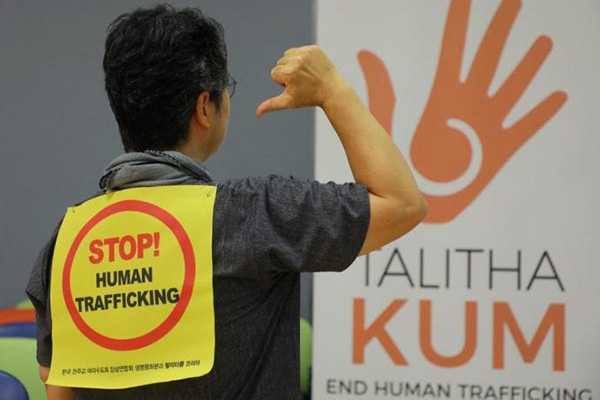
By Christopher White, National Correspondent
NEW YORK — From the White House to Vatican City, combatting the scourge of human trafficking has been a priority for popes and presidents alike in recent years.
Deb O’Hara Rusckowski, a delegate for the Order of Malta to the United Nations and co-Founder of Global Strategic Operatives, has made it her mission to get healthcare workers involved in the fight against trafficking, both in terms of providing aid to women seeking support and also to their children resulting from unplanned pregnancies while being trafficked.
Recently, Global Strategic Operatives has launched a yearlong pilot program, one which they hope the World Health Organization (WHO) will eventually consider as part of a universal policy on human trafficking for healthcare providers.
O’Hara Rusckowski spoke with The Tablet on the eve of its launch last month.
The Tablet:Six of the nation’s largest Integrated Delivery Healthcare Systems will now train all of their employees to identify victims of human trafficking. How did this idea come about?
O’Hara Rusckowski: The inception of the “Global Strategic Operatives for the Eradication of Human Trafficking” (GSOEHT) came after a group of high-level leaders convened at the United Nations on November 9, 2018, to a forum entitled “Practical Solutions to Eradicating Human Trafficking.”
Based on feedback from this event, and recognizing all the great work done thus far, it was decided to concentrate on one sector at a time, and we decided to focus on the healthcare sector. Evidence backs up our decision – up to 88 percent of victims seek medical care/treatment while being trafficked, and clinicians often misdiagnose these individuals and miss the signs due to lack of training and knowledge.
On a practical level, how will this training take place?
As of fall 2019, GSO began conducting a study of training Front Line Healthcare Providers to Identify Human Trafficking Victims and Take Appropriate Action in a half dozen large Integrated Healthcare Delivery Networks (IDNs) in the U.S. Each site has chosen a specific Emergency Department to conduct the training. At the end, all sites will have received a standardized evidence-based, validated training program by CommonSpirit Health, and Selah Freedom, after establishing a policy and protocol within their own institution. What has proved to be invaluable during the training, is when each site holds a ‘Community Leadership Meeting’ which introduces the healthcare leadership team to their local community agencies and shelters, law enforcement, DA’s Office/Attorney General’s Office HT Task Forces, FBI and Homeland Security to establish and build relationships and define their roles.
In a collaborative spirit, all participating GSO healthcare sites will share their best practices with each other. I am happy to report, in just the four sites who have completed training thus far, 1,368 people have been trained. However, when you look at the entire # of employees in total for all six large IDNs – there will be 240,000 persons who will have received human trafficking training (not counting for new hires and natural attrition rates!)
Part of the hope of this is that women who have unplanned pregnancies will be provided with greater options in order to support their pregnancies. Can you tell me more about this?
I have included as part of the training a packet called “Special Populations” which includes information on “Alternatives and Options for Pregnant Trafficked Victims” and then other information on men and boys. It includes places where women can be referred to and sent for pre- and post-natal care for them, as well as care for their babies – all who have been very happy to accept and place them within their policy and procedures manual in the ED and Social Work Departments.
Also, I’m working with Malta and the Catholic Church to open up new safe homes, some specifically for pregnant trafficked victims, where today, there are few if any in the U.S. dedicated for such.
Pope Francis has decried human trafficking as “a crime against humanity.” How has the medical community responded to date to combatting human trafficking in the trenches?
They are getting better once they are educated. It takes this treating to change stigmas and perceptions from a prostitute and drug seeker to a victim being forced to dress that way and one who is being forced to take drugs against their will. These are the cultural paradigm shifts we see from our trainings.
We teach every person is deserving of respect and dignity – and they may not act pleasant or appreciative of the care offered until they, the victims themselves, go through some healing. This is why we have survivors trained to teach the beginning of the HT 101 part of the training. This gives evidence to the hope they need to see -the goodness that is inside all the survivors.

Human trafficking is indeed a crime against humanity. All forms of exploitation and dehumanization should be banished from the face of the earth.